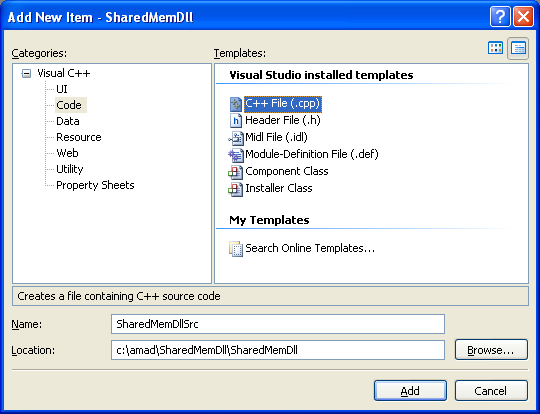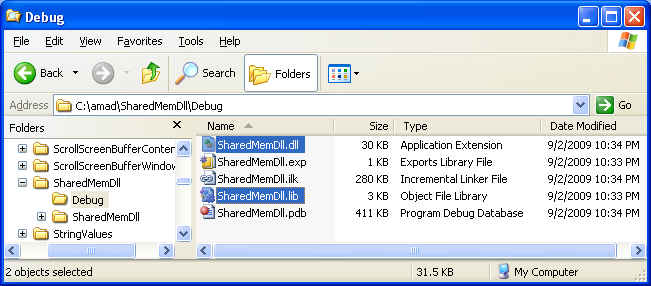Windows Dynamic-Link Libraries 9
Using Shared Memory in a Dynamic-Link Library Example
The following example demonstrates how the DLL entry-point function can use a file-mapping object to set up memory that can be shared by processes that load the DLL. The shared DLL memory persists only as long as the DLL is loaded. Applications can use the SetSharedMem() and GetSharedMem() functions to access the shared memory.
DLL that Implements the Shared Memory
The example uses file mapping to map a block of named shared memory into the virtual address space of each process that loads the DLL. To do this, the entry-point function must:
- Call the CreateFileMapping() function to get a handle to a file-mapping object. The first process that loads the DLL creates the file-mapping object. Subsequent processes open a handle to the existing object.
- Call the MapViewOfFile() function to map a view into the virtual address space. This enables the process to access the shared memory.
Note that while you can specify default security attributes by passing in a NULL value for the lpAttributes parameter of CreateFileMapping(), you may choose to use a SECURITY_ATTRIBUTES structure to provide additional security.
Create a new empty Win32 console application project. Give a suitable project name and change the project location if needed.

Then, add the source file and give it a suitable name.

Next, add the following source code.
// The DLL code
#include <windows.h>
#include <memory.h>
#define SHMEMSIZE 4096
static LPVOID lpvMem = NULL; // pointer to shared memory
static HANDLE hMapObject = NULL; // handle to file mapping
// The DLL entry-point function sets up shared memory using a
// named file-mapping object.
BOOL WINAPI DllMain(HINSTANCE hinstDLL, // DLL module handle
DWORD fdwReason, // reason called
LPVOID lpvReserved) // reserved
{
BOOL fInit, fIgnore;
switch (fdwReason)
{
// DLL load due to process initialization or LoadLibrary
case DLL_PROCESS_ATTACH:
// Create a named file mapping object
hMapObject = CreateFileMapping(
INVALID_HANDLE_VALUE, // use paging file
NULL, // default security attributes
PAGE_READWRITE, // read/write access
0, // size: high 32-bits
SHMEMSIZE, // size: low 32-bits
Ldllmemfilemap); // name of map object
if (hMapObject == NULL)
return FALSE;
// The first process to attach initializes memory
fInit = (GetLastError() != ERROR_ALREADY_EXISTS);
// Get a pointer to the file-mapped shared memory
lpvMem = MapViewOfFile(
hMapObject, // object to map view of
FILE_MAP_WRITE, // read/write access
0, // high offset: map from
0, // low offset: beginning
0); // default: map entire file
if (lpvMem == NULL)
return FALSE;
// Initialize memory if this is the first process
if (fInit)
memset(lpvMem, '\0', SHMEMSIZE);
break;
// The attached process creates a new thread
case DLL_THREAD_ATTACH:
break;
// The thread of the attached process terminates
case DLL_THREAD_DETACH:
break;
// DLL unload due to process termination or FreeLibrary
case DLL_PROCESS_DETACH:
// Unmap shared memory from the process's address space
fIgnore = UnmapViewOfFile(lpvMem);
// Close the process's handle to the file-mapping object
fIgnore = CloseHandle(hMapObject);
break;
default:
break;
}
return TRUE;
UNREFERENCED_PARAMETER(hinstDLL);
UNREFERENCED_PARAMETER(lpvReserved);
}
// The export mechanism used here is the __declspec(export)
// method supported by Microsoft Visual Studio, but any
// other export method supported by your development
// environment may be substituted.
#ifdef __cplusplus // If used by C++ code,
extern C { // we need to export the C interface
#endif
// SetSharedMem sets the contents of the shared memory
__declspec(dllexport) void SetSharedMem(LPWSTR lpszBuf)
{
LPWSTR lpszTmp;
DWORD dwCount=1;
// Get the address of the shared memory block
lpszTmp = (LPWSTR) lpvMem;
// Copy the null-terminated string into shared memory
while (*lpszBuf && dwCount<SHMEMSIZE)
{
*lpszTmp++ = *lpszBuf++;
dwCount++;
}
*lpszTmp = '\0';
}
// GetSharedMem gets the contents of the shared memory
__declspec(dllexport) void GetSharedMem(LPWSTR lpszBuf, DWORD cchSize)
{
LPWSTR lpszTmp;
// Get the address of the shared memory block
lpszTmp = (LPWSTR) lpvMem;
// Copy from shared memory into the caller's buffer
while (*lpszTmp && --cchSize)
*lpszBuf++ = *lpszTmp++;
*lpszBuf = '\0';
}
#ifdef __cplusplus
}
#endif
Build and run the project. The generated DLL is ready to be used as shown in the following screenshot.

Shared memory can be mapped to a different address in each process. For this reason, each process has its own instance of lpvMem, which is declared as a global variable so that it is available to all DLL functions. The example assumes that the DLL global data is not shared, so each process that loads the DLL has its own instance of lpvMem. Note that the shared memory is released when the last handle to the file-mapping object is closed. To create persistent shared memory, you would need to ensure that some process always has an open handle to the file-mapping object.